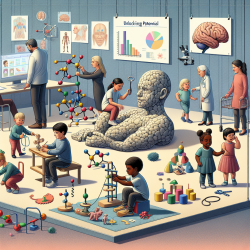Introduction
In an era where global crises like the COVID-19 pandemic highlight the interconnectedness of our world, the role of interprofessional education in healthcare becomes increasingly vital. A recent study titled "Student-led interprofessional global health course: learning impacts during a global crisis" sheds light on how interprofessional education can enhance healthcare professionals' understanding and response to global health challenges. This blog post explores how practitioners, especially those involved in online therapy services such as TinyEYE, can leverage the findings of this study to improve their skills and outcomes for children and other vulnerable populations.
The Importance of Interprofessional Education
The research conducted at McGill University involved a ten-week Interprofessional Global Health Course (IPGHC) that engaged students from various healthcare disciplines. The study revealed significant improvements in students' knowledge across 11 global health topics, including Canadian Indigenous health, global burden of disease, and systemic racism in healthcare. These findings underscore the importance of interprofessional education in broadening healthcare professionals' perspectives and equipping them with the skills needed to address complex health issues.
Key Takeaways for Practitioners
For practitioners in speech-language pathology and other healthcare fields, the study offers several key takeaways:
- Enhanced Understanding: Engaging in interprofessional education can lead to a deeper understanding of global health issues and the roles of different healthcare professionals.
- Improved Collaboration: By learning alongside peers from other disciplines, practitioners can improve their ability to collaborate effectively, which is crucial in addressing multifaceted health challenges.
- Application to Practice: The knowledge gained from interprofessional courses can be directly applied to practice, enabling practitioners to provide more comprehensive and culturally sensitive care.
Encouraging Further Research and Education
While the study highlights the benefits of interprofessional education, it also calls for further research to explore its long-term impacts on healthcare practice. Practitioners are encouraged to seek out opportunities for continued learning and collaboration with professionals from other fields. This can be achieved through participation in interprofessional courses, workshops, and online platforms that facilitate cross-disciplinary interaction.
Conclusion
In conclusion, the findings from the McGill University study emphasize the value of interprofessional education in enhancing healthcare professionals' ability to respond to global health challenges. By embracing interprofessional learning, practitioners can improve their skills, foster collaboration, and ultimately achieve better outcomes for their patients. As we navigate an increasingly complex global health landscape, the importance of working together across disciplines cannot be overstated.
To read the original research paper, please follow this link: Student-led interprofessional global health course: learning impacts during a global crisis.










